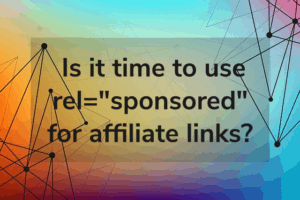Many website owners always add the “nofollow” attribute to all outbound affiliate links. In September 2019 Google announced the creation of the “sponsored” attribute for website owners and content creators to use. So, should you use “nofollow” or “sponsored” on your affiliate links?
What is “nofollow”?
In case you don’t know what “nofollow” means, let’s briefly go over it. If a hyperlink has the “nofollow” attribute attached then it’s a signal you’re giving to Google and other search engine bots, to essentially ignore the link, or in other words, don’t give that website any extra ranking or authority boost because of the link. Without that attached Google may see the link as a positive signal for the website.
Here’s how a link looks when the “nofollow” attribute is added:


Whichever tag you use has no impact on the clicker, the experience of the person using your website doesn’t change.
For some links you don’t have full control of the hyperlinks, for example on Twitter, Facebook, and virtually all other social media sites. In that scenario you don’t need to worry about it. For the purpose of this we’re mainly talking about websites you own. The classic case being niche content websites and blogs containing affiliate links.
So why have I always added the “nofollow” tags using the rel attribute to all outbound affiliate links?
Mainly because I think search engine bots are generally smart enough to work out anyway that it’s an affiliate link and I’ve always thought that they devalue them relative to plain editorial links. By me telling them to ignore it I feel like that adds extra weight and shows I’m a responsible content creator. While at the same time I’m not having to cloak the links, which can be viewed in a negative way by search bots.
It also helps create a clearer definition between editorial links that are in content, and affiliate links. I don’t add “nofollow” to editorial links because I actually want them to be followed by the search engine bots and recognised because they are of value (otherwise I wouldn’t be linking to them).
Sometimes affiliate links don’t go to the main website domain anyway, they use a tracking link. It could be a subdomain, or an entirely separate domain altogether, as is often the case with networks. Come to think of it not many programs are like Amazon where you are actually linking to the Amazon domain. And thanks to canonical tags I believe they do get an SEO boost as a result of affiliate links to them.
Google’s introduction of the “sponsored” attribute
The picture got messier thanks to new additions by Google to the “rel” attribute.
On September 10th 2019 Google officially announced that they were making changes to the “rel” attribute. Instead of only having rel=”nofollow”, we now also have rel=”sponsored” and rel=”ugc”. UGC is an abbreviation of user-generated content. If you wish to read the official guidelines on this, see the Search Console Help page here.
Here is how a sponsored link looks:


Does it make a difference for affiliates?
I think this does change the picture a bit for affiliates. Certainly, we don’t need to worry about “ugc”, but should affiliate links be marked as “sponsored”, because we stand to benefit financially from them? For now, as I write this, I’m leaving my existing links as they are. However, I will continue to monitor the situation. As per the Google guidelines, “nofollow” should continue to be a suitable value for the rel attribute. And to be honest, going around changing a huge amount of links would be a nightmare!
Do I think not changing them all would result in a big hit to the rankings? No. Because there’s so many factors that affect rankings. And if page content is high-quality, unique, and meeting users needs, I’d be shocked if Google felt it appropriate to damage a site simply because the webmaster hadn’t changed the attribute on a link.


Personally, I also like systems that are simple and consistent. For me to always add the rel=”nofollow” attribute to all outbound affiliate links, and never to editorial links, has always kept it simple and clear for me. With the new “sponsored” attribute coming in I am going to now be moving to always use that for all affiliate links going forward. I think that is the correct use of it. But I will continue to monitor things in the industry to see if there’s any clarity on what the Google hierarchy wants affiliates to use.
You can play it how you want to and make your own decision. I’m not saying there is a crystal clear right way to do it, because I don’t have any data. But my decision was finalized when I saw what John Mueller had said in a Google Hangout. You can watch the original video and read the transcript here.
Hopefully this information helps you make a decision for your digital business.
